A year with Marcelo Bielsa: the inside story of Leeds United's revival
In Marcelo Bielsa's first year as Leeds coach, the Yorkshire side almost ended their stint in the wilderness. As they finally seal their return to the Premier League, we revisit how the Argentinian coach ended up in the north of England
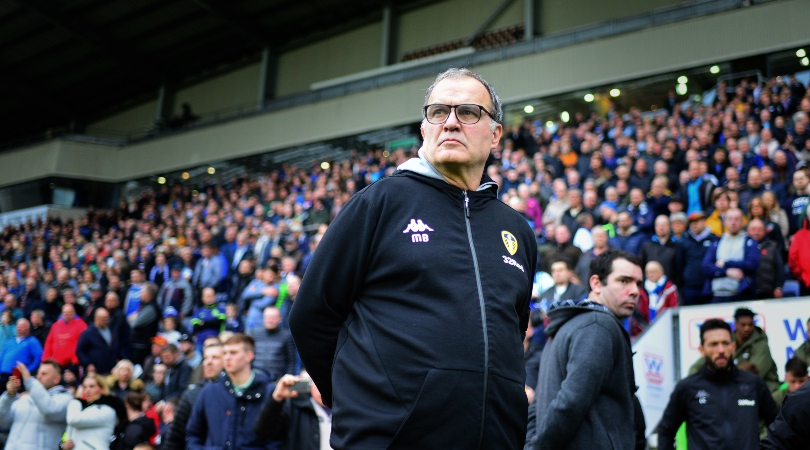
This article first appeared in the May 2019 issue of FourFourTwo. Subscribe now and get six months for less than a tenner!
The meeting took place at a hotel in Buenos Aires, beginning in the sunshine at 10am and finishing indoors an hour before midnight. They broke for a meal in the middle, on Marcelo Bielsa’s insistence, but even then they spoke about football – not in a broad or abstract sense, but keen, purposeful conversations about managing Leeds United. No one who sat down and listened to Bielsa doubted that he was taking the job.
The delegation sent from Leeds to negotiate, director of football Victor Orta and chief executive Angus Kinnear, had hedged their bets by contacting other coaches of the same ilk, but one of their alternatives made the wrong impression by struggling to name a single player in the squad. When Bielsa first received contact, he sat up through the night to watch footage of Leeds’ previous campaign, then phoned Orta the following morning. By the time they met face-to-face in Argentina, he had watched every game in full; 70 hours of a season that Leeds – having finished 13th – were trying to forget.
Orta and Kinnear asked him what seemed to be the crucial question: “What do you know about the Championship?” Bielsa, with sheets of paper spread across the table, responded by running the pair through the formations used by every club in the division.
They call Bielsa ‘El Loco’, but he is obsessive rather than unhinged. His 2018/19 is the story of a compulsive, unparalleled coach who flew 7,000 miles to join a team with an addictive quality. Leeds United are English football’s ultimate narcotic: labelled with several health warnings but impossible to leave alone once the club, the city and its soul have you hooked.
West Ham courted Bielsa some time earlier but presented him only with the vague remit of establishing a better finishing position in the Premier League. Bielsa saw no meaningful objective in that. The directive from Leeds was clear: end a decade-and-a-half of wallowing below the top tier. In return, the club offered him the highest salary ever paid to a manager at Elland Road.
But Bielsa, now into his 60s, was indifferent about the money and amused the hierarchy at Leeds by taking minimal interest in the terms of his contract. At heart he’s a romantic, a native of Rosario – the port city north-west of Buenos Aires – who supported, played for and managed his local club, Newell’s Old Boys, to the point that his heart was lost to them. Newell’s named their stadium after Bielsa in 2009, and he reciprocated last year by putting in more than £2 million of his own money to fund a brand new facility at the club’s training ground. “I’m paying a debt, not making a gift,” explained Bielsa, “because they are the club that formed me.”
Get FourFourTwo Newsletter
The best features, fun and footballing quizzes, straight to your inbox every week.
And there was something about Leeds which touched the same part of him. They were a renowned institution with a starved fanbase, searching for deliverance. The job oozed romantic appeal.
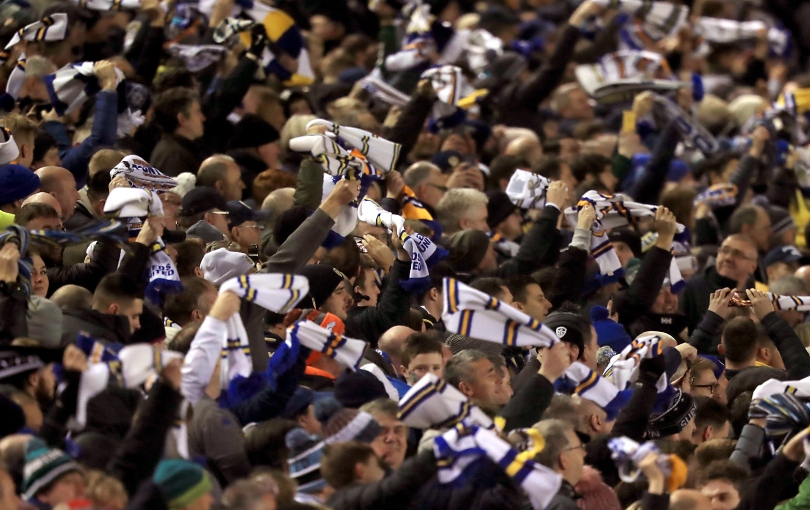
Style and dedication are Bielsa’s selling points. He’s a modern thinker who employed tactics that are considered innovative today as long ago as the early 1990s. However, his reputation depends entirely on substance, in an Instagram world which is alien to him.
Thomas Christiansen, Leeds’ head coach for the first half of 2017/18, had a wardrobe to die for but he was dead in the job by the middle of January 2018, unable to take the pressure. Bielsa wears the same oversized club tracksuit almost at all times, be that on the touchline, in press conferences, on the streets outside Leeds’ training ground or in the coffee shop every Sunday.
The club had initially housed him in Rudding Park, a high-end spa close to Harrogate, but Bielsa quickly tired of hotel living and asked to be closer to the Whites’ training complex in the village of Thorp Arch. He found an apartment in Wetherby and insists on walking 45 minutes to and from it every day, hood up, headphones in, rucksack on. Offers of a lift from passing journalists are declined with thanks. “I like to walk,” Bielsa tells them. However, he spends so much time in his office that a renovation of the facilities at Thorp Arch provided him with a bed, small lounge and kitchenette – literally sleeping on the job.
Leeds were advised when they sat down with Bielsa in Buenos Aires that he wanted changes to their Thorp Arch training ground. To their surprise, he had already acquired blueprints of the property, and soon he was recommending modifications to supply beds for his players to rest in between training sessions, plus a relaxation area with pool table, PlayStation and, bizarrely, a log burner that Bielsa hoped his squad would take turns in maintaining.
Leeds began building within weeks of his appointment and finished the project around Christmas, though not without a week’s delay caused by Bielsa complaining that the light switches between each bed were off-centre. Next on the list for an upgrade is a swimming pool built in the days when former chairman Peter Ridsdale chucked money at everything, and is now almost obsolete. “The club must take into account the fact that players spend a lot of time here,” said Bielsa.
The substance of his training matters too, as does the success of it. Leeds’ pre-season was long and hard, stretching to triple sessions and forcing many of Bielsa’s players to stay in a nearby hotel overnight. Most were told to lose weight and body fat as Bielsa prepared them for the tireless, possession-based game which has kept United in the Championship’s top six from the first weekend of this season onwards.
Right-back Luke Ayling shed half a stone. Goalkeeper Jamal Blackman, a loan signing from Chelsea, lost around 18lbs before breaking a leg in November, having been left on the substitutes’ bench while Bielsa waited for him to hit various targets. The squad took one day off in August, and a four-day break in February was the team’s first extended stint away from training.
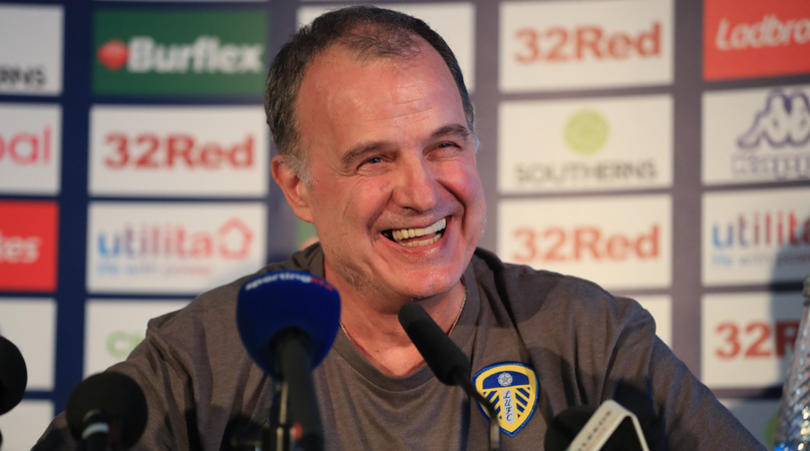
TACTICAL ANALYSIS 7 things Marcelo Bielsa will bring to the Premier League
In such circumstances, other coaches might have faced players rebelling over the schedule. But Bielsa’s reputation kept perfect order and, crucially, his methods were shown to work.
He was Leeds’ big investment last summer; the peg on which their majority shareholder, Andrea Radrizzani, hung everything. Some £7m was spent buying striker Patrick Bamford from Middlesbrough in July but the club offset that outlay by selling Ronaldo Vieira, an England Under-20 midfielder, to Sampdoria the following week. Bamford was one of only two permanent signings and Blackman one of four loan deals, an influx supplemented in January by the arrival of Spanish goalkeeper Kiko Casilla from Real Madrid.
Bielsa, in essence, picked up a squad who had lost their way badly and finished in the bottom half of the Championship last season, then propelled them to the top of the table at Christmas. For many weeks, left-back Barry Douglas was the only new face in his line-up.
Employing Bielsa came down to the theory that the input of a coach with disciples from Pep Guardiola at Manchester City to Diego Simeone at Atletico Madrid would elevate the performances of players who were also-rans under different management. Courting him was seen as such a long shot that Orta had no expectation of success when Radrizzani told him to make the phone call. “I think it’s impossible for him to come,” insisted Orta.
Bielsa, in the spirit of Gordon Strachan – the last Leeds captain to win promotion from the second tier – trains his squad as he expects them to play. He runs them into the ground, applies heavy amounts of tactical repetition and uses a large backroom team to coach players individually. The improvement of footballers who were all at sea in the same league 12 months ago is credited in part to the tailored work Bielsa does with them. Every Wednesday, 45 minutes are set aside for a ‘murderball’ session: 11 vs 11 with no free-kicks and the ball in play constantly. The Argentine uses one of his assistants to officiate, but tackles fly in and the contest rages unchecked.
Yet despite the intensity of it all, Bielsa chose to run with a small group by the standards of the Championship, using fewer than 20 senior professionals and asking the academy to plug any gaps. Seven under-23s have made first-team bows this season, wet behind the ears but good enough for Bielsa, and he fights the modern notion that squad rotation is fundamental. “When a team wins regularly, no one is tired,” he claimed. Also, in his mind, fewer surplus players means fewer noses put out of joint.
The revolution has not been without issues. Injuries have gone through the roof since pre-season, though medical staff there say soft-tissue damage – an indicator that players have been pushed to the point where their bodies give in – is lower than average. Bielsa also found himself in the eye of an unhelpful storm in January, when one of his many interns was stopped by police after being spotted outside Derby County’s training ground 24 hours before the Rams lost 2-0 at Elland Road.
In what immediately became known as ‘Spygate’, the Argentine admitted to sending staff to watch every Championship club’s training sessions – although security features at different complexes meant those scouts were able to observe only 11 – and Leeds were fined £200,000 by the Football League for conduct which, in the governing body’s own words, “fell significantly short of the standards expected”.
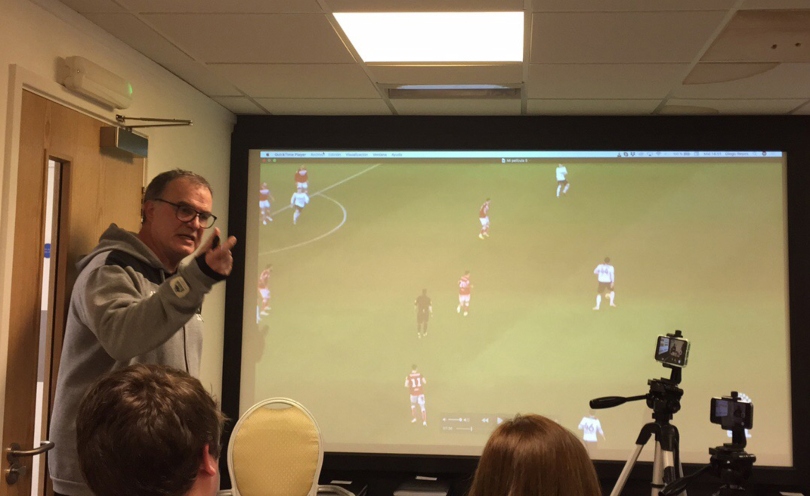
Bielsa was nonplussed about the anger he incurred. Watching the opposition prepare was common practice in Argentina, and every one of his training sessions at Athletic Bilbao, his employers between 2011 and 2013, took place in public. The week after his intern was confronted in Derby, Bielsa held a 66-minute briefing at Thorp Arch to detail his pre-match analysis in full and explain why, in light of him possessing so much legitimate detail about Frank Lampard’s team, “I don’t need to go to watch a training session of an opponent to know how the opponent plays”.
So what was the point of doing it, then? “It allows me to keep my anxiety low,” admitted Bielsa. “We think by doing that and gathering information, we get closer to a victory, even though we know it’s not true. In my case, I’m stupid enough to allow myself this behaviour.” An extraordinary look into Bielsa’s machine shone a light on his obsessional and paranoid attitude – not unlike Don Revie, whose dossiers at Leeds during the 1960s and ’70s were years ahead of their time.
The Argentine’s engagement with the media is limited but fascinating; a gradual drip of his thoughts and anecdotes which let everyone listening into his head, slowly. There are no one-on-one interviews, no impromptu press briefings (his ‘Spygate’ presentation aside) and nothing offered outside of the pre- and post-match conferences. Bielsa has said on more than one occasion that he owes every reporter the same right to question him and hear him speak, but some in South America say he was stung in the early stages of his career by an off-the-record discussion that came back to bite him.
When journalists gather, he speaks without a time limit. His introduction at Elland Road ran for more than an hour and 20 minutes – so long, in fact, that Bielsa stopped midway through and asked his translator if he needed a break. The manager’s harsh gaze avoids all eye contact, usually fixed to the floor, while his face gives very little away.
Translator Salim Lamrani is an academic who joined Bielsa’s staff at Lille, having first come into contact with the Argentine while he was managing Marseille. His task is an unenviable one: he’s a Frenchman translating English into Spanish and back again for a coach whose own grasp of English is not yet strong enough for him to speak fluently. After all, Bielsa turned 64 in July and this is his first job in England. The Whites arranged language lessons for him when he agreed to come on board.
There is a cult following behind Bielsa, and a fascination driven by the coaches, players and former players who hail him as a genius. His time with Leeds has attracted journalists from his native Argentina, Germany, Chile, France, Mexico and Japan. His comments swing from the philosophical to the tactical, and tactics are where Bielsa’s imagination comes alive: he uses a 4-1-4-1 formation against teams with one striker, and 3-3-1-3 (a system that earned his ‘El Loco’ nickname at Newell’s 30 years ago) when the opposition play with two up front. His players are coached to slip neatly between the two structures mid-game, overloading the wings and using interplay in congested areas to get through the wall of defenders in front of them. Tim Vickery, the South American football writer, described Bielsa as the “high priest of the high press”, and only once this term have Leeds conceded a greater share of possession.
Bielsa, though, is still open to innovation. He found some of what he’s discovered in the Championship enlightening, particularly Chris Wilder’s unconventional use of overlapping centre-backs at Sheffield United. “I’ve seen very few people with these ideas,” said Bielsa. “I saw things in Sheffield United I wanted to develop, but I couldn’t do it.”

On occasions, his train of thought reminds the room of how far he has travelled and how much he has seen. A throwaway question on his devotion to Plan A – he once said, “The idea of having alternative plans is considered a virtue, but I do not agree with this point of view” – resulted in an eight-minute apology to Hernan Crespo over a perceived slight that had occurred when Bielsa was Argentina manager almost 20 years earlier. The ex-Milan, Inter and Chelsea striker accepted the apology in a Twitter statement the next day.
Bielsa moves with the times in tactical and technological terms, but football’s growth as a business, and its fixation on results, rankles. “It’s the responsibility of all of us to discuss the position of the importance of results above the beauty of the game,” he said. “I don’t know if the analogy is good – I’m sure it’s not, and it’s disproportionate – but the fact we’re not taking care of the planet? Our children will pay the consequences of our acts. With football it will be the same, because we are destroying football and in the future we’ll see the negative effects.”
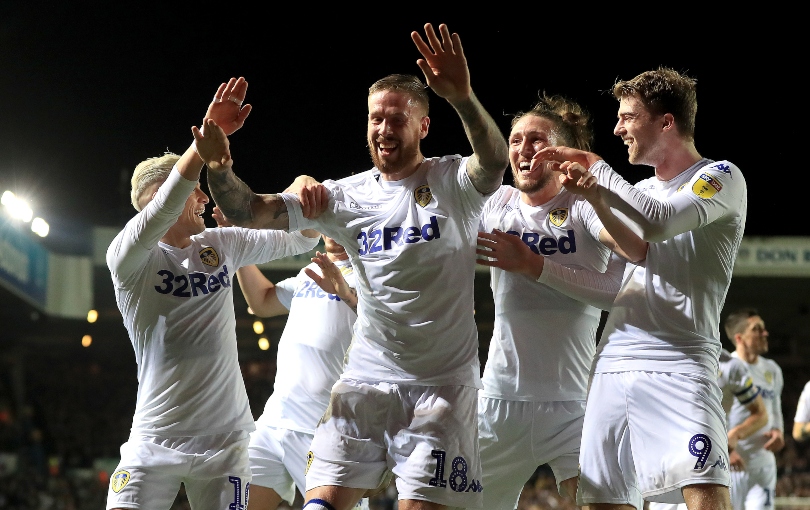
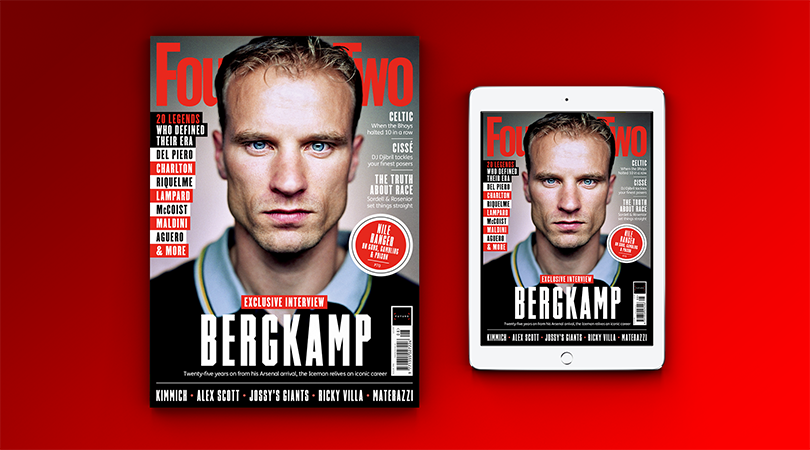
OUT WEDNESDAY Bergkamp exclusive, when Celtic stopped 10 in a row, Kimmich, Nile Ranger, Atalanta, Jossy’s Giants, Materazzi and more
Leeds are experiencing the opposite process with Bielsa, shifting from a sustained period where the only distraction from the monotony of mid-table Championship finishes was some spectacularly bad ownership of the club, to a time where the stadium is routinely sold out. Season ticket holders number more than 22,000 and the club plan to suspend further sales if they return to the Premier League, to ensure that some seats are available to more occasional supporters.
Bielsa insisted that Leeds stay in a hotel the night before every game, even for the home fixtures, and they’re mobbed by crowds when the team bus arrives at Elland Road. The hotel is set up with a room for four analysts to chop up their video footage and send relevant clips to different players via WhatsApp, in between individual and team meetings. Club staff have taken to calling it ‘Mission Control’.
Seeing the change from Bielsa’s stern persona in press briefings to his body language among the general public is like watching ice melt. There are lollipops for children when he steps off the team bus, and invites to Thorp Arch for supporters who engage him in the street. Before Christmas, he asked the club to go and buy – with Bielsa’s money – a phone, a laptop, a widescreen television and a car. Bielsa then organised a raffle for the day-to-day staff at the training ground and gave it all away: a TV for one of the canteen workers, a Volkswagen Polo worth £11,000 for a kit man (who, by all accounts, flogged it and shared the proceeds with other colleagues).
Although Bielsa has a distant relationship with his squad – “I love my players,” he said, “but if they were close to me then they would respect me less because they would see how I really am” – he has warmed to Leeds and warmed to Yorkshire, too. He has a ranch in the countryside near Rosario and finds himself on the cusp of the North Yorkshire Moors in Wetherby. His daughter is back home, and his wife flies over to visit him occasionally, but during his first year he is believed to have returned to Argentina only once since his appointment.
Leeds went all-in on Bielsa and Bielsa went all-in on them, explicit from the start that he would not be cutting corners. When Radrizzani took him around Thorp Arch on his first day in England, Bielsa complained about a mark left on a wall by someone leaning against it with their feet. “They disrespect the facility,” said Bielsa. No one has rushed to test his patience since.
Leeds, historically, are a complex club where politics play havoc and leave managers at the mercy of the shambles around them. But Bielsa’s authority was absolute from day one, by virtue of a reputation which exceeded that of anyone in either the dressing room or boardroom at Elland Road. The supporters love his football and love his character – an unusual and amusing blend of humility, intelligence and eccentricity which casts him as a man of the people. Shortly after Leeds’ pre-season friendly at York City in July 2018, he was pictured strolling unannounced into a McDonalds on the A59.
The marriage, inevitably, didn’t come cheap for Leeds. Bielsa and most of his staff – loyal lieutenants who drop everything and go with him whenever he goes – come as a package, and they command combined salaries of more than £3m. Meanwhile, the refurbishment of the club’s training complex has already cost around £600,000, spent on improving a facility which Leeds intend to vacate for a new base in the city centre during the next few years.
It’s small money in player transfer terms but a significant outlay on coaching talent. That’s where Radrizzani staked most of his chips in the hope of righting the savage consequences of relegation from the Premier League in 2004 and making it back to the big time. The club who so famously gambled and lost the lot finally appear to have hit the jackpot.
While you’re here, why not subscribe to the mag - just £9.99 for the first six months, over £38 cheaper than buying it in the shops!
NOW READ...
NEW PREMIER LEAGUE KITS 2020/21 Every released home and away shirt so far
GUIDE Premier League live stream best VPN: how to watch every game from anywhere in the world

